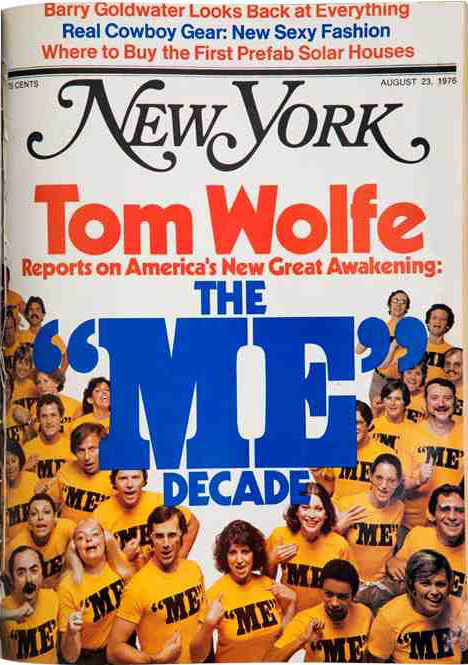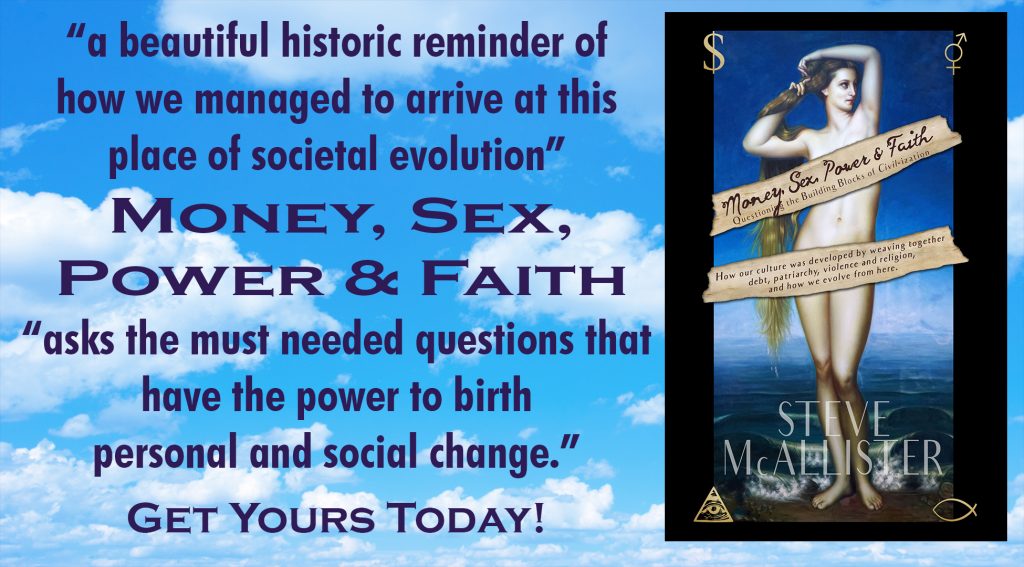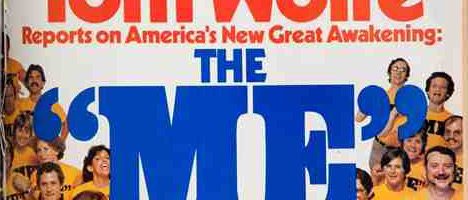The following is a chapter from Money, Sex, Power & Faith.
Order your copy in paperback or for Kindle!
“In an individual, selfishness uglifies the soul; for the human species, selfishness is extinction.” – David Mitchell, Cloud Atlas
“By the 1960s the common man was also getting quite interested in this business of ‘realizing his potential as a human being,’” wrote Tom Wolfe in 1976 for New York Magazine. “But once again he crossed everybody up! Once more he took his money and ran—determined to do-it-himself!”5

As the Hippies and Yippies grew in number throughout the 1960s, reaching for a higher sense of community and creativity, and a more peaceful existence than industrialism had to offer, they came to take on the military industrial complex and its war in Vietnam, from which veterans returned to picket signs instead of educations, as at the height of America’s happiness. Trying to fight those who had devoted themselves to fighting, the Hippie movement was crushed, and disillusionment continued as the fragmented got jobs in the auspices of industrialism. Their faith diminished in the aftermath of not beating the system, they joined it again, and re-assumed the program as the tide of capitalism promised to raise all boats to float on the currency of money.
Dubbing this movement “The Me Generation”, Wolfe went on to describe the changes being sought in people’s lives and livelihoods. “The old alchemical dream was changing base metals into gold. The new alchemical dream is: changing one’s personality—remaking, remodeling, elevating, and polishing one’s very self… and observing, studying, and doting on it. (Me!) This had always been an aristocratic luxury, confined throughout most of history to the life of the courts, since only the very wealthiest classes had the free time and the surplus income to dwell upon this sweetest and vainest of pastimes. It smacked so much of vanity, in fact, that the noble folk involved in it always took care to call it quite something else.”
With a generation no longer assimilating the traditions of community, family, and religion as previous generations had, the American population adapted their devotion to honor the two things that could replace what they had lost, money and drugs. In a civilization built upon money as its foundation, finance was the obvious replacement for God, due to its omnipresence throughout virtually every aspect of culture and its ability to exceed God in forgiving moral indiscretions and universal ethics. Throughout the 1980s, as Gordon Gekko established in Wall Street, the prevailing ethic proclaimed that “Greed is Good.” Without the structure of community, family, and religion, and the reservations of inhibition which accompany them, Americans were free to revel in the release of at least a few levels of authority and embrace the hedonism and selfishness money had to offer.
“The capitalist-consumerist ethic is revolutionary in another respect,” says Yuval Noah Harari in Sapiens. “Most previous ethical systems presented people with a pretty tough deal. They were promised paradise, but only if they cultivated compassion and tolerance, overcame craving and anger, and restrained their selfish interests. This was too tough for most. The history of ethics is a sad tale of wonderful ideals that nobody can live up to. Most Christians did not imitate Christ, most Buddhists failed to follow Buddha, and most Confucians would have caused Confucius a temper tantrum.
“In contrast,” Harari continues, “most people today successfully live up to the capitalist-consumerist ideal. The new ethic promises paradise on condition that the rich remain greedy and spend their time making more money, and that the masses give free rein to their cravings and passions – and buy more and more. This is the first religion in history whose followers actually do what they are asked to do.”2
In the culture of consumerism, whether we are consuming money, drugs, foods, products, or natural resources, we are still consumed by the desire to replace what we have lost in our lack of religious faith, hope of community, and love of family. Yet the benefits of this culture are just enough to keep us lulled into satisfaction through immediate gratification and the unbridled pursuit of pleasure. Unfortunately, as our disillusionment has continued to increase, we are now faced with a population steeped in addictions as an after effect of embracing so much of what is outside of us in order to fill the chasm within.
Although the journey of the Hippies and Yippies didn’t ultimately raise their vibrations to the alignment with Divinity they sought, the drugs that had helped boost them high enough still had their pleasurable benefits. Despite the “War on Drugs” that Nixon started, over the next few decades, drugs became the go-to method for altering our realities in order to exist amid the reality that had been manufactured around us. Yet as Nixon and Nancy Reagan led the charge against the recreational drugs of marijuana, cocaine, and their accompanying illegal cartels, the pharmaceutical industry capitalized on the apparent demand for numbness, and supplied legal drugs to help people deal with the breakdown of the culture they had known.
However, not all favored the chemical route to euphoria. Although the generation was defined by the individual, even when self-fulfillment didn’t involve the addition of supplementary chemical sedation, much of what has been celebrated over the last few decades has involved the glorification of things outside the individual, the unyielding collection of stuff, and an unhealthy obsession with materialism.
Lost in a sea of failed myths and limiting beliefs, we embraced an off-kilter economic system and general distrust for those who share our world with us. Instead of leaning on family, faith, and community, we put our trust in corporations to provide for us as they had during our previous period of prosperity.
Order your copy of Money, Sex, Power & Faith today!


